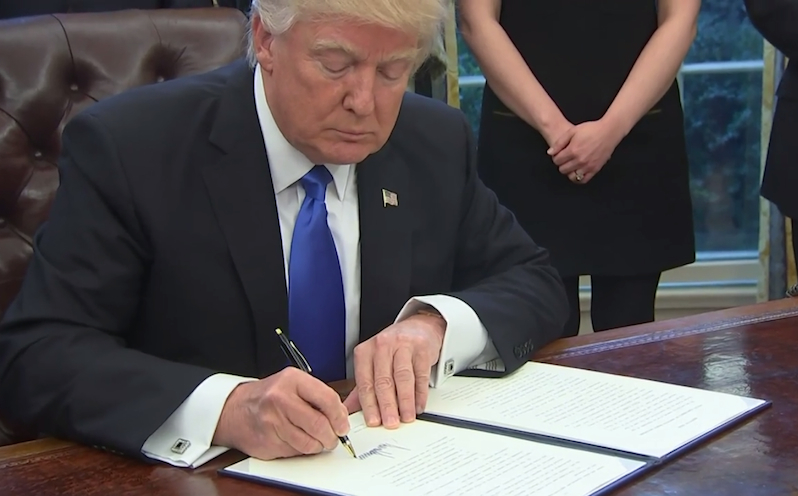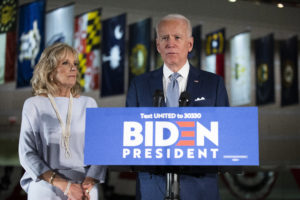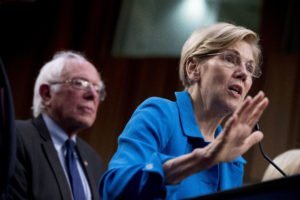Trump’s Tweets Are a Sideshow: His Executive Orders Are Building a Corporate State
The Trump era heralds a growing assault on basic government and progressive values. President Trump signs an executive order in late January. (Screen shot via The Hill)
1
2
President Trump signs an executive order in late January. (Screen shot via The Hill)
1
2
Congress Joins In
This same pattern is recurring across federal government. But it’s not just with presidential appointments and executive orders. The most solid legal footing for any policy is to be a law passed by Congress and signed by the president, with fine-print regulations adopted under an ensuing rulemaking process.
Most of the press attention is now focused on Trump’s nominees to lead federal agencies and their beliefs. All of Trump’s finalists to lead the Food and Drug Administration want to reverse decades of precedent for approving new drugs. One contender, Jim O’Neill, a former Health and Human Services Department officials who is an associate of Peter Thiel, Trump’s friend and a Silicon Valley billionaire, wants people to use new drugs “at their own risk.” While that kind of deregulation steps on scientific protocol, to say nothing of possibly leading to medical marketing that’s even more hyped than it is now, his views are part of a pro-privatization continuum that is sweeping Congress.
A parallel legislative effort now under way would “redefine science to make issuing health regulations almost impossible,” Stanton Glantz, a UC San Francisco professor who has long studied and criticized the way tobacco companies have flouted public health laws, wrote to his list-serv on Monday. Glantz is referring to a bill slated for a hearing Tuesday in the House Committee on Science, Space and Technology that would limit the research that can be used by the Environmental Protection Agency for drafting industry-curbing regulations.
As Sharon Lerner reported for Intercept.com, this science-curtailing approach was “based on a strategy cooked up by tobacco industry strategists more than two decades ago” by limiting EPA to using data “that can be replicated or made available for independent analysis.” The problem with that standard, she wrote, is “health research often contains confidential personal information that is illegal to share,” thus thwarting precise replication and laws protecting the public. Another part of the bill would allow “industry to keep much of its own inner workings and skewed research secret from the public, while delegitimizing studies done by researchers with no vested interest in their outcome.”
This trend of protecting industry profits while disregarding public impacts isn’t just found in that one bill. Late last week, the House and Senate both voted to “overturn a [U.S. Securities and Exchange Commission] rule designed to stop oil companies striking corrupt deals with foreign governments” by requiring U.S. firms to disclose their billions in payments to foreign governments “in return for rights to natural resources,” said GlobalWitness.org, an anti-corruption group.
“Global Witness notes with concern the complete fabrication of the facts by the Republican leadership in their presentation about the [to-be-discarded] Cardin-Lugar transparency provision,” the group said. “They have relied on the American Petroleum Institute’s ‘facts,’ which have been discredited over the past six years in multiple fora, while being totally unwilling to hear an alternative view.”
License to Pre-Empt
The emerging federal takeover by corporate privateers has a statewide corollary: Republican-controlled legislatures and governors pre-empting progressive local laws adopted in the Democratic strongholds and cities in their states. If anything, the developments in Washington will only empower the stateside Republicans.
Democrats in deep blue coastal states like California see themselves as a new line of defense against Trump’s excesses. Their ability to draw lines and say no will be tested in federal courts soon enough. The executive orders to take away federal funds from sanctuary cities that do not help immigration authorities to deport visa-less immigrants will be a key early test case.
But across much of the nation, a different political dynamic threatens Democrats. Most Democrats live in cities under Democratic mayors, even in red states. Many cities have adopted progressive local laws that Republicans in their capitals want to overrule by pre-empting them with new laws affecting the entire state. In 2017, the GOP controlled the entire Legislature and governor’s office in 24 states. In contrast, Democrats controlled 78 percent of the nation’s 40 largest cities.
Republicans, increasingly, have sought to block actions by cities on a range of economic, environmental, human rights and workplace issues, Pew’s Stateline just wrote. “The stage looks set for more confrontation between cities and states this year,” they predicted. “Already state lawmakers in Texas and Arkansas are weighing bills that would ban cities from declaring themselves ‘sanctuaries…’ Lawmakers in Kentucky, Virginia and six other states are considering preventing localities from allowing transgender people to use some restrooms.”
The progressive policies targeted by red states for pre-emption include: new gun controls, anti-fracking ordinances; creation of local utility districts, plastic bag fees and much more. “About 32 states now prohibit localities from regulating ride-hailing companies such as Uber, 23 [states] ban the local minimum wage, 15 [states] ban cities from requiring companies to offer sick days, and three ban [LGBTQ] anti-discrimination ordinance,” Stateline reported.
Surveying the entire spectrum of Trump’s executive orders, his federal agency appointees, the flurry of congressional pro-privatization legislation, and state-side attacks on Democrat-run cities, reveals the true extent of the coming assault on basic government and progressive values that puts people before profits. With Congress and federal agencies swiftly being occupied by corporate privateers, progressives are going to be looking to local lines of defense for the kinds of public services and safety nets they want. But those too are under attack.
“This is really about cities asserting the rights of cities to decide for themselves, consistent with their own community’s values, what solutions are in the best interest of their community,” Tallahassee’s Gillum told Stateline.
In Trump’s America, with the help of a heavy-handed Republican Congress and Republican legislators ready to pre-empt progressive policies, Gillum’s premise will be put to the test. The only thing certain is that more confrontation is coming.
Steven Rosenfeld covers national political issues for AlterNet, including America’s democracy and voting rights. He is the author of several books on elections and co-author of “Who Controls Our Schools: How Billionaire-Sponsored Privization is Destroying Democracy and the Charter School Industry” (AlterNet eBook, 2016).
Your support matters…
SUPPORT TRUTHDIG
Independent journalism is under threat and overshadowed by heavily funded mainstream media.
You can help level the playing field. Become a member.
Your tax-deductible contribution keeps us digging beneath the headlines to give you thought-provoking, investigative reporting and analysis that unearths what's really happening- without compromise.
Give today to support our courageous, independent journalists.






You need to be a supporter to comment.
There are currently no responses to this article.
Be the first to respond.